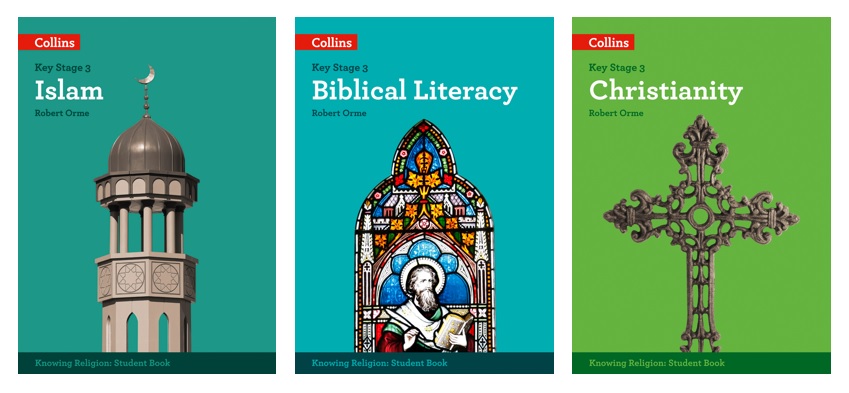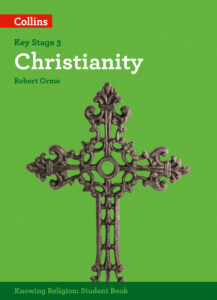Knowing Religion is a new series of nine Key Stage 3 RE textbooks. ‘Christianity’ is published as part of the KS3 Knowing Religion series. In this blog, we discuss the Christianity textbook with Series Editor and author of Islam, Christianity and Biblical Literacy, Robert Orme.

 There is no shortage of drama in the 2000-year long story of Christianity. How a marginal cult suspiciously viewed as a threat to the stability of the Roman Empire became the official religion of that very Empire is a remarkable tale. How the lives of Christians changed from being burnt by the Romans as human candles and fed to vicious dogs, to being lavished with imperial power and wealth, is the kind of transformation of fortunes that film writers strive to conceive. How Christianity continued through many schisms to become the global religion followed by over 2 billion people around the world today is by all accounts some achievement. Through a memorable narrative filled with dramatic twists and turns ‘Christianity’ helps KS3 pupils understand the key ideas of this extraordinary religion.
There is no shortage of drama in the 2000-year long story of Christianity. How a marginal cult suspiciously viewed as a threat to the stability of the Roman Empire became the official religion of that very Empire is a remarkable tale. How the lives of Christians changed from being burnt by the Romans as human candles and fed to vicious dogs, to being lavished with imperial power and wealth, is the kind of transformation of fortunes that film writers strive to conceive. How Christianity continued through many schisms to become the global religion followed by over 2 billion people around the world today is by all accounts some achievement. Through a memorable narrative filled with dramatic twists and turns ‘Christianity’ helps KS3 pupils understand the key ideas of this extraordinary religion.
In ‘Christianity’ the main ideas of the religion are situated within a historical narrative of the religion’s development. By learning how Christianity started, survived, spread and split into the 30,000+ denominations of today, pupils are enabled to see that religions and beliefs are not monolithic entities that fall from the sky or exist in a timeless vacuum, they originate in physical places, at particular points in history. Moreover, they continue to interact with that history and their modern contexts over hundreds, even thousands of years.
For example, by studying the conversion of Constantine and the defining doctrinal decision reached at the Council of Nicea, pupils can discover how the beliefs of mainstream Christianity could have been so very different. This historical knowledge can enable pupils to speculate in an informed, philosophical way why that didn’t happen. This approach is in contrast to both the thematic approach to studying religions and approaches which tend to isolate beliefs, practices and denominations from any given historical context in which they occurred.
For pupils who continue their study of Christianity to GCSE, an understanding of the history and development of Christianity is of great benefit. Examining the splits in Western Christianity that have so profoundly influenced Western civilisation is central to this. One can only make more than superficial sense of differing Christian views about issues studied at GCSE by knowing why different denominations, not to mention the religion itself, exist to begin with. Without an understanding of context, the ability to from judgements about the significance of ideas within religions is diminished.
The second half of each Knowing Religion book focuses on various internal debates within each religion and the ways in which the religion impacts, and is impacted by, the modern world. Christians today face a mixture of old and new challenges. In many non-Western countries, Christians continue to face severe persecution, while in the West, Christians face the newer challenges of science, secularism and shifting moral attitudes. How the religion has, and is, responding to these provocative and challenging issues is the focus of the second half of ‘Christianity’.
What place does Christianity have in modern Britain? What do people mean when they describe Britain as a ‘Christian country’ and are such statements either accurate or helpful? Why do different Christians interpret the Bible literally and liberally and what impact this has on their views about the origins of life, truth and ethics? Why do Christians disagree about the role of women in the Church? How logical or plausible are modern Christian responses to the age-old problem of evil? Why is it that in some churches dance, sing and jump, some chant and burn incense and others sit silently in a circle for an hour? Why is it that Christians are persecuted in two-thirds of countries around the world?
In a world in which religion has played, and continues to play, such a significant role, the value of learning about it is as great as ever. Understanding the dramatic story of Christianity over the past 2000 years and the vitality and malleability with which it exists in the modern world are essential to understanding our past, present and future. My hope is that by using this book, more pupils gain this valuable knowledge.
Take a closer look at Knowing Religion here: https://collins.co.uk/page/knowingreligion

Robert Orme



